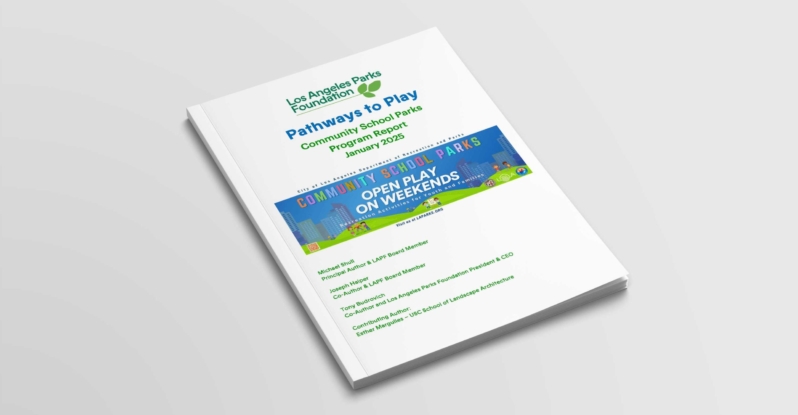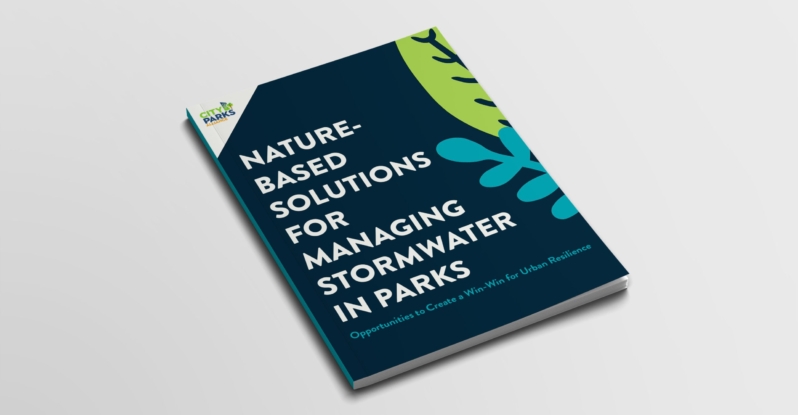Key Findings
- Many individuals with special needs lack opportunities to be physically active and to connect with their local environment
- Truly barrier-free design goes beyond ADA Standards for Accessible Design and is informed by inputs from local community members to address a wide variety of special needs
- Barrier-free parks also provide crucial spaces for parents and guardians with disabilities, including military veterans, to play with their children
Organization description
Fraser First Booster Club (Fraser First) is a tax-exempt 501(C)(3) nonprofit organization founded in 2010 by Vania Apps with the primary goal of raising funds for the creation of a barrier-free park in Macomb County, Michigan. As stated on its website, Fraser First has taken on the following initiatives:
- Seek private foundations and grants
- Educate the community
- Develop sponsorship programs
- Create and conduct ongoing fundraising
- Put “Fraser first” by first purchasing needed goods and services from Fraser businesses
- Promote Fraser businesses through its fundraising and promotional activities
Upon the completion of the McKinley Barrier-Free Park, Fraser First plans to continue developing new city parks in Fraser and to support the maintenance of existing city parks. While Fraser First is recognized by county and state level entities, it is a grassroots organization that runs entirely on the power and passion of its local volunteers.
Program description:
From its conceptual beginnings and design to its ongoing fundraising efforts and implementation, McKinley Barrier-Free Park is truly a product of its community. After the Fraser Parks and Recreation Department identified fourteen acres of underutilized open space, Vania Apps, Anna Cameron, and Vince Calabrese formed the Fraser First Booster Club to spearhead efforts to bring a new park to Fraser, Michigan. Through conversations with her community and engagement with special education teachers, it became clear that over 25,000 children and adults with special needs in Macomb County lacked opportunities to enjoy themselves at parks and playgrounds, to challenge themselves physically, and to connect with their natural environment. Thus, the dream of McKinley Barrier-Free Park, a boundless playscape to encourage inclusive play and to provide opportunities for outdoor recreation for these underserved individuals, was born.
McKinley Barrier-Free Park goes above and beyond compliance with ADA (Americans with Disabilities Act) Standards for Accessible Design. Under the guidance of Jim Ludwick of Ludwick & Associates and the incorporation of advice and requests from local parents, special needs educators, and physical therapists, McKinley Barrier-Free Park has been designed to be fully accessible from the moment one exits a car in the parking lot. The enlarged parking area can accommodate up to 54 cars and has a bus drop, linked walk, and zero curbs to ensure universal access. A “comfort station” includes family-style restrooms with an adult size changing table, which is a rarely provided but crucial amenity for some individuals with special needs.
Video “Fly-Thru” of Park Design
Rather than grass and woodchips that exclude individuals who rely on walkers and wheelchairs, McKinley Barrier-Free Park provides rubber surfacing and turf with firm foundations for “wheel-friendly” recreation. A sensory garden offers an opportunity for individuals to connect with nature in a variety of ways, introducing and highlighting unique smells, sounds, and sights to facilitate the experience of individuals with sensory challenges. This garden leads out to a one-mile walking path that winds through a natural Midwestern meadow, allowing all visitors to appreciate their native ecosystem. Future plans for the park include the installation of educational signage and creation of interactive programs to teach park-goers about local pollinators and indigenous plant species, as well as threats from invasive species.
The park is named for Dr. Otis McKinley, former mayor and “Father of Fraser” who founded McKinley airport in 1944. The boundless playscape has an aviation theme, including a jumbo airliner, jet interceptor, control tower, police cruiser, fire truck, slides, swings, and sensory exploration panels, to honor McKinley and his deep love of flying. However, the park reflects its local heritage in much more than name and theme. Fraser First’s fundraising efforts have been supported by many local individuals, organizations, and businesses. Fundraising initiatives and brainstorming sessions for McKinley Barrier-Free Park have also raised awareness of the social and structural challenges faced by individuals with special needs and have given local residents a sense of pride and love for their community as they take initiative to create this park.

Aviation-themed Boundless Playscape
“Phase One” of the park, including the construction of all underground plumbing and electricity, drainage systems, the parking area, the one-mile walking path, comfort station/restrooms, a pavilion, and sensory garden, is nearing completion and is slated to open in late September 2015. Fraser First continues to seek funds for “Phase Two,” the barrier-free playscape, and for additional requests and ideas for the park, e.g. supplementary guard rails on play equipment and environmental education programs.
Program goals/issues addressed
- McKinley Barrier-Free Park will be the first playground of its kind in Macomb County, an area with over 25,000 individuals with special needs
- Within the special needs community, there is a high level of obesity, due in part to lack of barrier-free places to be physically active
- Amidst growing development in Fraser, McKinley Barrier-Free Park “conserves” 14 acres of open, public space for the local community
Timeframe (planning/execution)
- 2010: Fraser First Booster Club created to raise funds
- 2012: $300,000 Michigan National Resource Trust Fund Grant received
- 2013: Groundbreaking Ceremony for McKinley Barrier-Free Park Celebrated
- 2015: (Anticipated) Park opens in late September with a new barrier-free parking lot, one-mile walking path, comfort station (picnic pavilion + special restrooms), and sensory garden
- Summer 2016 (Anticipated): Park playscape completed and open to public
Funding Sources and Partnerships
- The Fraser First Booster Club has held numerous community fundraisers (nearly monthly in frequency) since its inception in 2010
- Local “Business Heroes” host Park-$-Ching Meters to raise funds as well as provide discounts and donations of goods and services to Fraser First fundraisers and special events
- In 2012, Michigan Natural Resource Trust Fund Grant of $300,000 allowed for the design of the park and implementation of “Phase One.”
- In December 2015, a Michigan Department of Natural Resources Land and Water Grant of $100,000 enabled the implementation of “Phase Two,” the barrier-free playscape.
- The Fraser First Booster Club is continuing to fundraise and to apply for grants to complete the playscape and provide additional amenities for McKinley Barrier-Free Park
Results Achieved/Impact
This project is still in progress, so many promising results are currently anticipated. However, the fundraising and design process alone has raised awareness of barriers faced by individuals with special needs and has increased the sense of local Fraser pride as the community works together to create McKinley Barrier-Free Park.
Contact:
Vania Apps, Fraser First Booster Club President
vania@fraserfirst.com
(586) 294-8501


